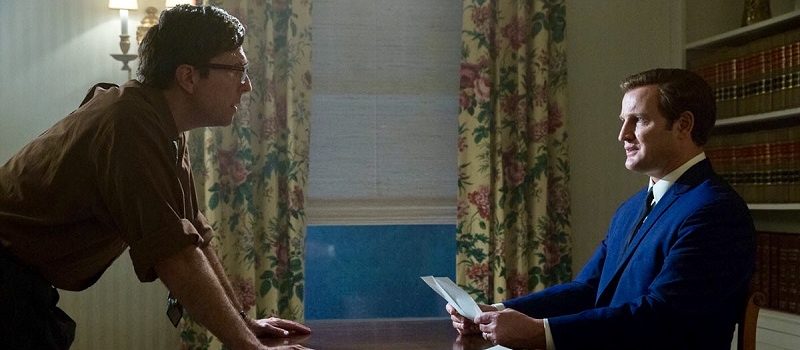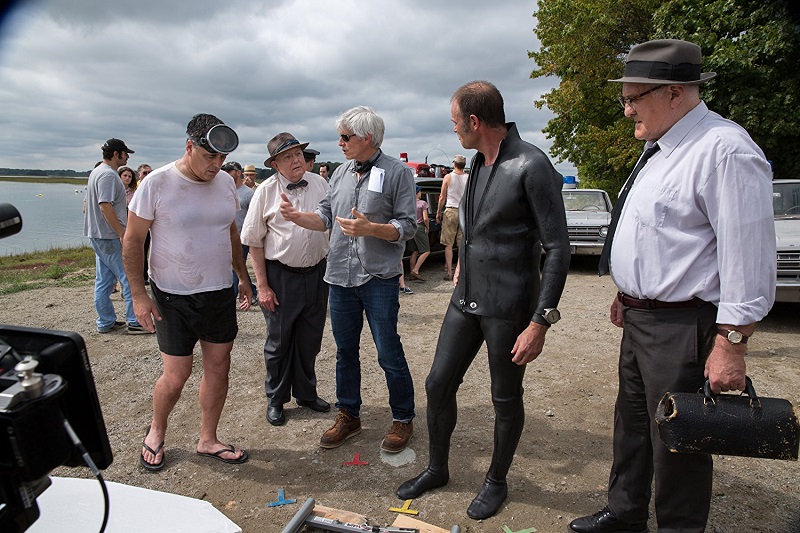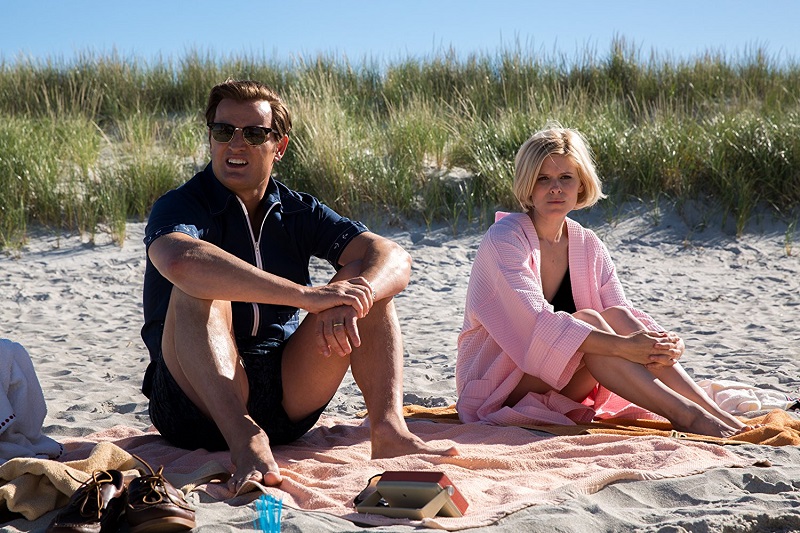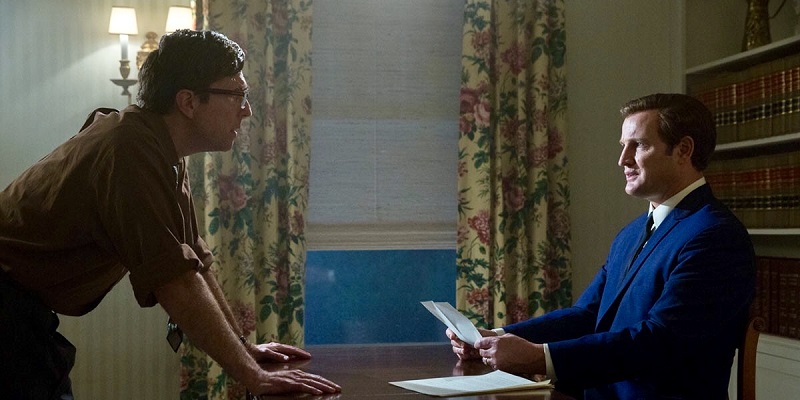There are tragedies that have haunted the Kennedy clan over the decades. Quite a few of them have been documented through the art of cinema. One that has yet to be told via the beloved medium of celluloid is Chappaquiddick. That continual dark cloud that has hung over the beloved American dynasty finds Ted Kennedy crashing his car into the water and the death of a woman who was not his wife.
In director John Curran’s Chappaquiddick, Teddy is a high-profile Senator. He’s considering a run for president in 1972 against Nixon and there are many who believe that he will win. On a fateful weekend in July of 1969, he is enjoying a weekend home in his native state, He attends a party with a few close friends and campaign aides (including a veteran from his brother Bobby’s tragic 1968 presidential run, Mary Jo Kopechne (Kate Mara)).
When it gets late, Ted decides to head back to his hotel and offers to drive Kopechne home. What happens next has great influence over the future of the man himself, but also it could be argued that it changed the course of the American republic.
There was a cover-up. Then, Kennedy came clean. Is his home state of Massachusetts, he remained beloved and went on to greatness over a decorated career in the U.S. Senate. But, his time on the national stage would be forever stained.
The other aspect of this story that is stunning to watch in Curran’s brilliant film is how that fateful weekend in Chappaquiddick is seen from two perspectives. It was also the weekend that found America finally realize JFK’s dream of putting a man on the moon. That is quite the contrast to what the younger Kennedy brother was experiencing — what with fighting for his political career at the least and his freedom at the most.
The Movie Mensch spoke to Curran exclusively and got some priceless insight into the making of Chappaquiddick, what made Clarke the ideal thespian to tackle the iconic American political figure and how the filmmaker managed to find a pitch perfect balance between one brother’s greatest triumph and the other brother’s greatest tragedy — all occurring over the same weekend.
The Movie Mensch: Why do you think, after so many decades, we as a society are still so interested in Chappaquiddick and what happened there?
John Curran: I was nine when it happened, so I’m of a generation that remembers it. I think that it’s hard to not to think about what could have been if there had not been this accident. Anyone who is familiar with Teddy Kennedy in 1969 knows that it’s very likely he would have skated into the (Democratic) nomination in ’72 and I think he would have beaten Nixon. I think he would have wrapped up the war earlier and I think there wouldn’t have been Watergate. Who knows where we’d be today if the 60s not ended with Chappaquiddick? That’s part of the fascination. There are an equal number of people who are not Ted Kennedy fans and they’re equally as fascinated for different reasons — they think someone got away with murder.
The Movie Mensch: Some people, including this guy, think that if Bobby Kennedy had not been assassinated, he would have won in 1968 and a lot of these what ifs would apply that that too…
John Curran: Oh yeah. Well, Bobby was the star of the family. The greatest loss for us as a country is that we never had Bobby Kennedy as a president.
The Movie Mensch: I love how you framed Chappaquiddick with its implications of history. We all know how much our lives have improved because of what Senator Kennedy did in the Senate over his career. Yet, there is this moment, at Chappaquiddick, where he seemed to do everything wrong. Was that a balance you sought to take, or was it more organic in that it emanated from the story?
John Curran: Obviously the story doesn’t concern itself with what became of Ted in terms of how he rebuilt his life and what he did. We touch on it in the post-script. That was important to all of us, without laboring on it. That wasn’t what the film was about. Striking a balance wasn’t easy. I wanted to give a sense of a Phoenix rising from the ashes and accomplishing something extraordinary. Hopefully anyone is intrigued enough by the film who isn’t aware of Ted Kennedy would do a little bit of research and be surprised at how much he accomplished as a senator.
The Movie Mensch: Also, the juxtaposition of the triumph of his brother Jack and the mission to the moon and the soiled ground Ted was mucking in was brilliant. There’s even that one shot of him looking out over the water and the moon in the top corner of the shot. It’s brilliant…
John Curran: I’m so glad that you just said that! That was a visual effect that I had to argue for because there was some push back. It was said that, “no one’s gonna care that the moon is in the shot.” I said, “I guarantee that the moon is a motif in this film and you will feel it. People will care.” Thank you for saying that. I love you for saying that [laughs].
The Movie Mensch: [Laughs] Thanks! What a contrast over that whole week. Jack Kennedy’s getting credit for starting our march to the moon and Ted Kennedy is in the middle of the fight of his life with the tragedy at Chappaquiddick.
John Curran: That was a big revelation for me. I remember the moon landing because my grandmother forced us to watch it for four days. It was a whole lot of nothing and then some scientists talking. It was pretty dry stuff. My memory of that weekend is not Chappaquiddick, it was the moon landing. When I read it in the script, I was like, “wow.” I’d never conflated those two events. As a filmmaker, it was an exciting thing to put on film. It was like a Shakespearian irony. JFK’s greatest achievement happening on the weekend of Teddy’s lowest moment. I wanted the moon to hover over this whole story. Like the ghost of JFK in some way.
The Movie Mensch: Why was Jason Clarke the perfect choice to play Senator Kennedy?
John Curran: I’ve known Jason for a longtime. He was in my first film (1998’s Praise) in a very small role. I’ve always felt he was a best kept secret. What’s great about Jason is he has a face that’s not so recognizable and overplayed that you couldn’t play a Kennedy. He’s got extremely similar bone structures, eyes and that chin. I knew that he’s a smart enough actor with the right kind of chops that he wouldn’t do some corny impression of Ted. He’d find the character and own it. The reason I did the film was because I had the absolute confidence that he would knock it out of the park.
The Movie Mensch: Normally known for his comedic work, I was stunned by Ed Helms as Ted’s best friend. Was there an audition for Mr. Helms, or did you just know he could do it? What most impressed you about his talents once you got on set?
John Curran: I knew I was looking for an actor who could project intelligence that you would believe he was an accomplished lawyer in his own right and had a Northeastern quality in his own right. It was very important, besides the dramatic side of it, that I had someone that could understand the dry, understated humor. I was looking at some comedic actors in those key roles. I got really lucky with Ed Helms and Jim Gaffigan. They were both up to doing it.
The Movie Mensch: Have you had any insight into what the Kennedy family thinks about this film being made? Not that you should care… but was there any word? I mean, I think it’s a pretty fair portrayal.
John Curran: Look, they’re up against this all the time over the decades. They don’t want to know about it. The only thing that I’ve heard, that I will share with you, is one of them — through a mutual friend — said, “remember that they are human beings.” I think that that is a fair and appropriate comment. It is something I took to heart. I wanted to make sure we weren’t doing a one-dimensional hit piece. It was my responsibility to present him in this full complexity.




